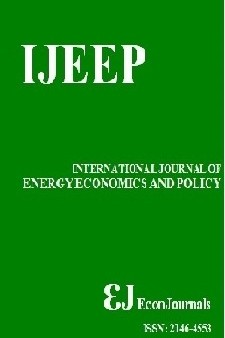Annulment of Oil Licences in Nigeria’s Upstream Petroleum Sector: A Legal Critique of the Costs and Benefits
Annulment of Oil Licences in Nigeria’s Upstream Petroleum Sector: A Legal Critique of the Costs and Benefits
- Başlangıç: 2011
- Yayıncı: İlhan ÖZTÜRK
Yusuf Opeyemi Akinwale, Ibikunle Olalekan Ogundari
Oil Price and Employment Nexus in Saudi Arabia
Tarek Tawfik Yousef ALKHATEEB, Haider MAHMOOD, Zafar Ahmad SULTAN, Nawaz AHMAD
Oladele I. Osanyinlusi, Bola A. Awotide, Taiwo T. Awoyemi, Adebayo I. Ogunniyi, Adeyemi A. Ogundipe
Transforming Waste Management Operations to Green Energy Initiatives: Opportunities and Challenges
Jy Shing Wu, H. K. Tseng, J. C. Ferrell, X. Liu
The Relationship of Economic Growth with Human Development and Electrıcıty Consumptıon in Indonesia
Hasan GUNGOR, Angela Uzoamaka SİMON
Lasara Fabricia Rodrigues, Matheus Alves Madeira Souza, Thamara Paula dos Santos Dias
José Maria Gonçalves Nunes de Melo, Samuel Façanha Câmara, Fabíola Gomes Farias, Fábio Nóbrega de Lima, Ana Augusta Ferreira de Freitas
